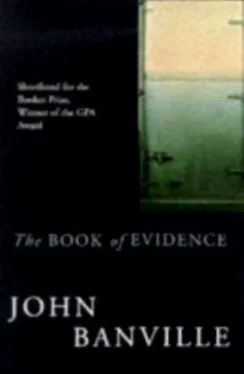When I say she was not good I do not mean she was wicked, or corrupt. The flaws in her were nothing compared with the jagged cracks that run athwart my soul. The most one could accuse her of was a sort of moral laziness. There were things she could not be bothered to do, no matter what imperatives propelled them to her jaded attention. She neglected our son, not because she was not fond of him, in her way, but simply because his needs did not really interest her. I would catch her, sitting on a chair, looking at him with a remote expression in her eyes, as if she were trying to remember who or what precisely he was, and how he had come to be there, rolling on the floor at her feet in one of his own many messes. Daphne! I would murmur, for Christ's sake! and as often as not she would look at me then in the same way, with the same blank, curiously absent gaze.
I notice that I seem unable to stop speaking of her in the past tense. It feels right, somehow. Yet she often visits me. The first time she came she asked what it was like in here. Oh, my dear! I said, the noise! – and the people! She just nodded a little and smiled wanly, and looked about her idly at the other visitors. We understand each other, you see.
In southern climes her indolence was transformed into a kind of voluptuous languor. There is a particular room I remember, with green shutters and a narrow bed and a Van Gogh chair, and a Mediterranean noon pulsing outside in the white streets. Ibiza? Ischia? Mykonos perhaps? Always an island, please note that, clerk, it may mean something. Daphne could get out of her clothes with magical swiftness, with just a sort of shrug, as if skirt, blouse, pants, everything, were all of a piece. She is a big woman, not fat, not heavy, even, but yet weighty, and beautifully balanced: always when I saw her naked I wanted to caress her, as I would want to caress a piece of sculpture, hefting the curves in the hollow of my hand, running a thumb down the long smooth lines, feeling the coolness, the velvet texture of the stone. Clerk, strike that last sentence, it will seem to mean too much.
Those burning noons, in that room and countless others like it – my God, I tremble to think of them now. I could not resist her careless nudity, the weight and density of that glimmering flesh. She would lie beside me, an abstracted maya , gazing past me at the shadowy ceiling, or at that chink of hot white light between the shutters, until at last I managed, I never understood exactly how, to press a secret nerve in her, and then she would turn to me heavily, quickly, with a groan, and cling to me as if she were falling, her mouth at my throat, her blind-man's fingertips on my back. She always kept her eyes open, their dim soft grey gaze straying helplessly, flinching under the tender damage I was inflicting on her. I cannot express how much it excited me, that pained, defenceless look, so unlike her at any other time. I used to try to have her wear her spectacles when we were in bed like this, so she would seem even more lost, more defenceless, but I never succeeded, no matter what sly means I might employ. And of course I could not ask. Afterwards it would be as though nothing at all had happened, she would get up and stroll to the bathroom, a hand in her hair, leaving me prostrate on the soaked sheet, convulsed, gasping, as if I had suffered a heart attack, which I suppose I had, in a way.
She never knew, I believe, how deeply she affected me. I was careful that she should not know it. Oh, don't mistake me, it was not that I was afraid I would give myself into her power, or anything like that. It was just that such knowledge would have been, well, inappropriate between us. There was a reticence, a tactfulness, which from the first we had silently agreed to preserve. We understood each other, yes, but that did not mean we knew each other, or wanted to. How would we have maintained that unselfconscious grace that was so important to us both, if we had not also maintained the essential secretness of our inner selves?
How good it was to get up then in the cool of afternoon and amble down to the harbour through the stark geometry of sun and shadow in the narrow streets. I liked to watch Daphne walking ahead of me, her strong shoulders and her hips moving in a muffled, complex rhythm under the light stuff of her dress. I liked to watch the island men, too, hunched over their pastis and their thimbles of turbid coffee, swivelling their lizard eyes as she went past. That's right, you bastards, yearn, yearn.
On the harbour there was always a bar, always the same one whatever the island, with a few tables and plastic chairs outside, and crooked sun-umbrellas advertising Stella or Pernod, and a swarthy, fat proprietor leaning in the doorway picking his teeth. It was always the same people, too: a few lean, tough types in bleached denim, hard-eyed women gone leathery from the sun, a fat old guy with a yachting cap and grizzled sideburns, and of course a queer or two, with bracelets and fancy sandals. They were our crowd, our set, our friends. We rarely knew their names, or they ours, we called each other pal, chum, captain, darling. We drank our brandies or our ouzos, whatever was the cheapest local poison, and talked loudly of other friends, characters every one, in other bars, on other islands, all the while eyeing each other narrowly, even as we smiled, watching for we knew not what, an opening, perhaps, a soft flank left momentarily unguarded into which we might sink our fangs. Ladies and gentlemen of the jury, you have seen us, we were part of the local colour on your package holiday, you passed us by with wistful glances, and we ignored you.
We presided among this rabble, Daphne and I, with a kind of grand detachment, like an exiled king and queen waiting daily for word of the counter-rebellion and the summons from the palace to return. People in general, I noticed it, were a little afraid of us, now and again I detected it in their eyes, a worried, placatory, doggie sort of look, or else a resentful glare, furtive and sullen. I have pondered this phenomenon, it strikes me as significant. What was it in us – or rather, what was it about us – that impressed them? Oh, we are large, well-made, I am handsome, Daphne is beautiful, but that cannot have been the whole of it. No, after much thought the conclusion I have come to is this, that they imagined they recognised in us a coherence and wholeness, an essential authenticity, which they lacked, and of which they felt they were not entirely worthy. We were – well, yes, we were heroes.
I thought all this ridiculous, of course. No, wait, I am under oath here, I must tell the truth. I enjoyed it. I enjoyed sitting at ease in the sun, with my resplendent, disreputable consort at my side, quietly receiving the tribute of our motley court. There was a special, faint little smile I had, calm, tolerant, with just the tiniest touch of contempt, I bestowed it in particular on the sillier ones, the poor fools who prattled, cavorting before us in cap and bells, doing their pathetic tricks and madly laughing. I looked in their eyes and saw myself ennobled there, and so could forget for a moment what I was, a paltry, shivering thing, just like them, full of longing and loathing, solitary, afraid, racked by doubts, and dying.
That was how I got into the hands of crooks: I allowed myself to be lulled into believing I was inviolable. I do not seek, my lord, to excuse my actions, only to explain them. That life, drifting from island to island, encouraged illusions. The sun, the salt air, leached the significance out of things, so that they lost their true weight. My instincts, the instincts of our tribe, those coiled springs tempered in the dark forests of the north, went slack down there, your honour, really, they did. How could anything be dangerous, be wicked, in such tender, blue, watercolour weather? And then, bad things are always things that take place elsewhere, and bad people are never the people that one knows. The American, for instance, seemed no worse than any of the others among that year's crowd. In fact, he seemed to me no worse than I was myself- I mean, than I imagined myself to be, for this, of course, was before I discovered what things I was capable of.
Читать дальше












